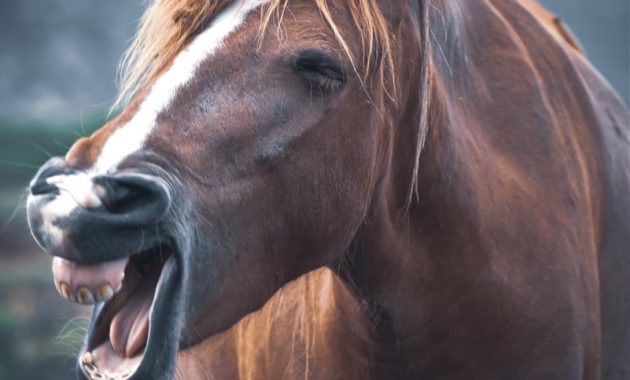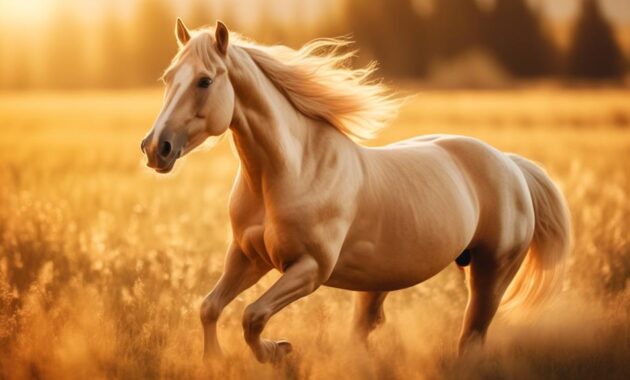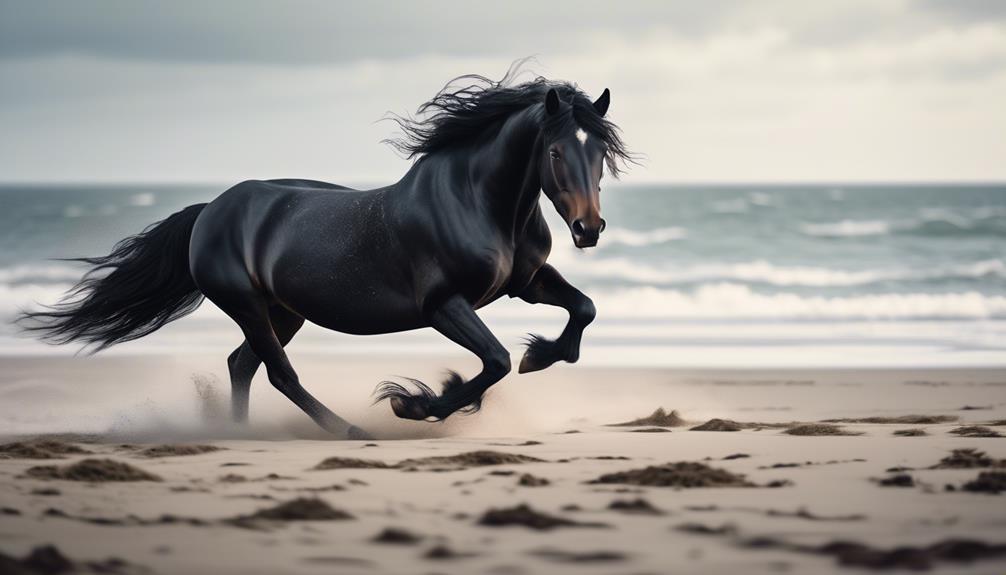
Did you know that Breton horses are one of the oldest and most versatile horse breeds in the world, with a history that can be traced back over thousands of years?
This fascinating breed has captivated horse enthusiasts around the globe, and in this discussion, we will explore the powerful beauty and versatile grace that makes Breton horses truly exceptional.
From their impressive physical attributes to their rich history and unique traits, there is so much to uncover about these magnificent creatures.
So, saddle up and get ready to embark on a journey filled with wonder and admiration for the remarkable Breton horses.
Key Takeaways
- The Breton horse breed is known for its muscular physique, strength, and large size.
- Breton horses are calm, friendly, and easy to train, making them suitable for all levels of horse owners and riders.
- They are versatile and can be used for light draft work, agricultural work, and pleasure riding.
- Breton horses come in a variety of colors, such as red roan, blue roan, chestnut, bay roan, bay, gray, and chestnut. Regular grooming is important for their health and well-being.
Breton Horse Breed Overview
Breton Horses are renowned for their powerful beauty and versatile grace. These horses come in various heights and weigh around 1,764 pounds. They’ve a muscular and strong physique, and can live up to 25 years.
Breton Horses are suitable for all levels of horse owners and riders. When it comes to their history, their origins are unclear, but theories suggest migration and Celtic warrior involvement. During the Middle Ages, the Breton horse was divided into Roussin and Sommier types. There are three subtypes of the breed: Postier Breton, Heavy Draft Breton, and Corlay Breton.
Breton horses have calm and friendly personalities, making them easy to train and work with. They’re also versatile and sturdy, suitable for light draft work, agricultural work, and pleasure riding.
Breton Horse Breed History
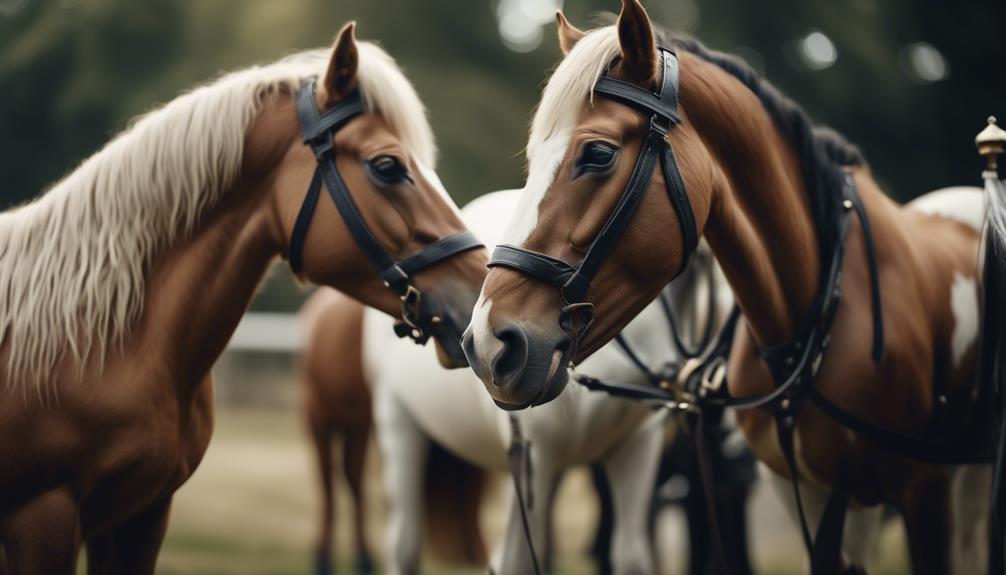
As we explore the captivating history of the Breton horse breed, it becomes evident that their origins remain a mystery, although theories suggest a connection to migration and Celtic warrior involvement. The history of the Breton horse is shrouded in intrigue and speculation, adding to its allure.
Here are three fascinating facts about the breed’s history:
- Middle Ages Division: During the Middle Ages, the Breton horse was divided into two types: the Roussin, which was lighter and used for riding, and the Sommier, which was heavier and used for draft work.
- Three Subtypes: The Breton horse is further classified into three subtypes: the Postier Breton, known for its elegance and speed; the Heavy Draft Breton, prized for its strength and endurance; and the Corlay Breton, a versatile type used for various purposes.
- Crossbreeding: Throughout history, the Breton horse has been crossbred with other strong and powerful breeds such as the Boulonnais, Percheron, and Ardenness horses, resulting in a versatile and sturdy horse with exceptional capabilities.
The Breton horse’s history is a testament to its resilience, adaptability, and enduring legacy.
Breton Horse Breed Traits
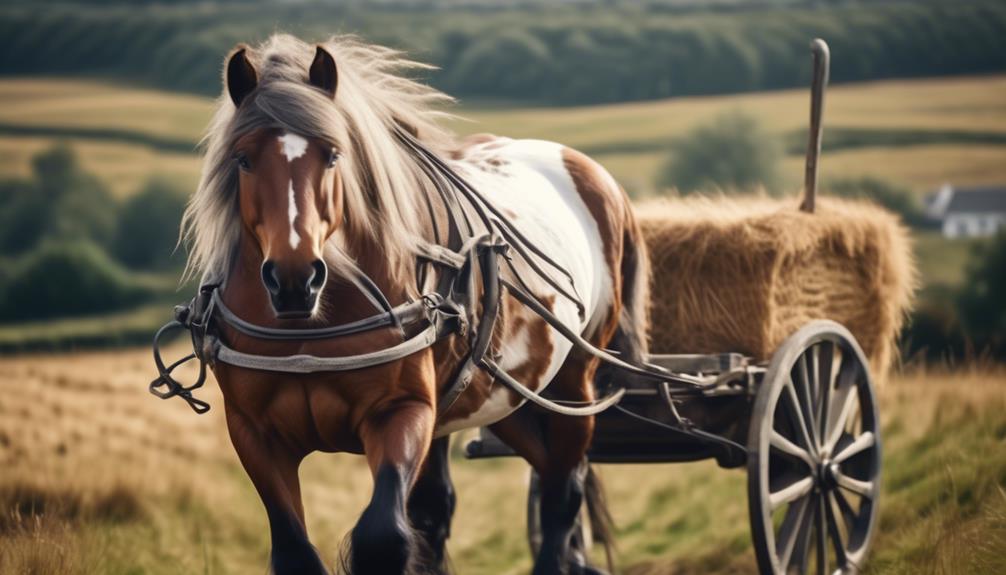
With their calm and friendly nature, Breton horses are known for their versatility and adaptability. These horses have a reputation for being calm, kind, friendly, and easygoing. They’re also highly trainable and willing to work.
Their versatility makes them suitable for various purposes, including light draft work, agricultural work, and pleasure riding. Breton horses are sturdy and strong, with muscular physiques that make them well-suited for these tasks. They’re also noble and lively, adding an extra touch of grace to their powerful beauty.
In addition to their work capabilities, Breton horses have been bred for meat in certain countries. Overall, Breton horses possess a unique combination of traits that make them a beloved and valuable breed.
Breton Horse Overall Description
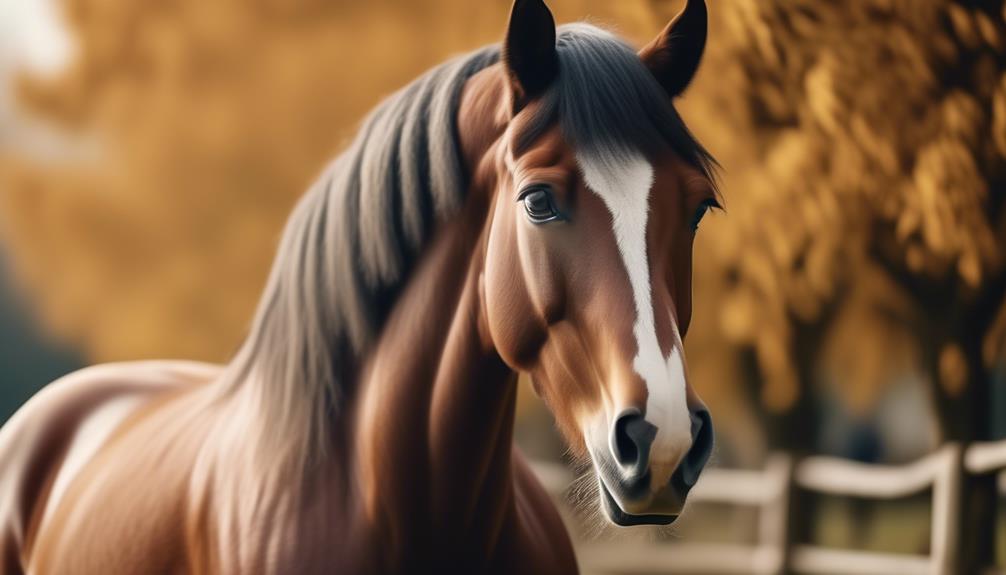
After learning about the versatile and adaptable nature of Breton horses, it’s time to delve into their overall description. Here are three key features that make Breton horses stand out:
- Muscular and short legs with feathering: Breton horses have strong, stout legs that are well-muscled and adorned with feathering, which adds to their distinctive appearance.
- Short and broad back: Their backs are short and broad, providing a sturdy foundation for carrying heavy loads or riders.
- Wide and muscular chest: Breton horses have a wide and muscular chest, allowing them to have the strength and power needed for various tasks, whether it be pulling a plow or excelling in equestrian sports.
These physical attributes, combined with their noble and friendly temperament, make Breton horses a remarkable breed that’s both beautiful and versatile.
Breton Horse Colors
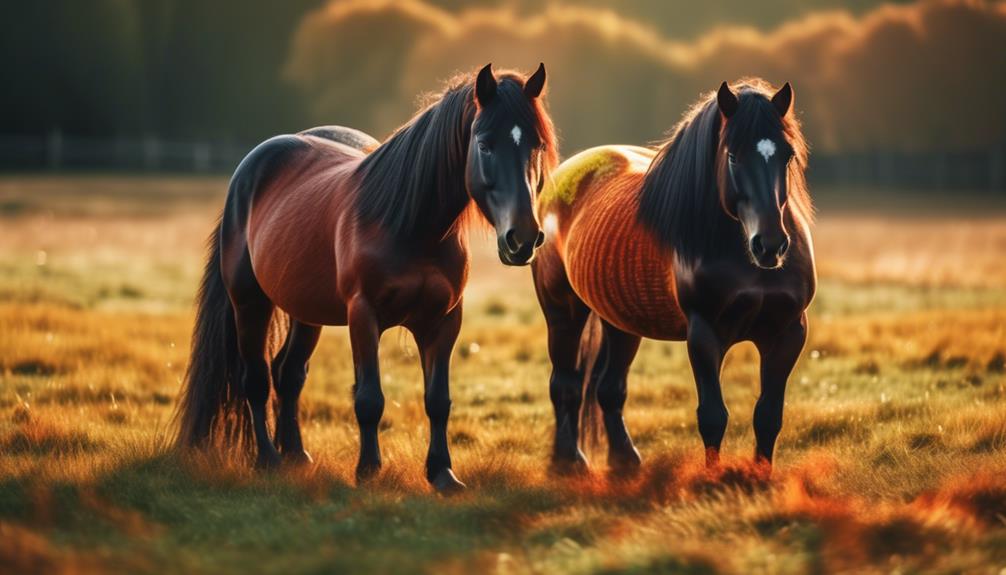
Breton horses showcase a variety of captivating colors that add to their unique charm and appeal. From red roan to chestnut with a sand-colored mane and tail, these horses come in a range of stunning shades. Other colors include bay roan, bay, gray, and chestnut. Each color brings its own beauty and enhances the Breton horse’s overall appearance. Regular grooming is important to maintain the horse’s coat and keep it looking healthy and happy. This includes bathing with horse-specific shampoo when necessary and thorough cleaning of the hooves. To groom a Breton horse properly, you will need a curry comb, dandy brush, body brush, tail and mane brush, and a soft cloth for sensitive areas. With proper care, these magnificent horses will continue to shine in their vibrant colors.
| Common Colors | Other Colors |
|---|---|
| Red Roan | Bay Roan |
| Blue Roan | Bay |
| Chestnut | Gray |
Breton Horse Grooming Requirements
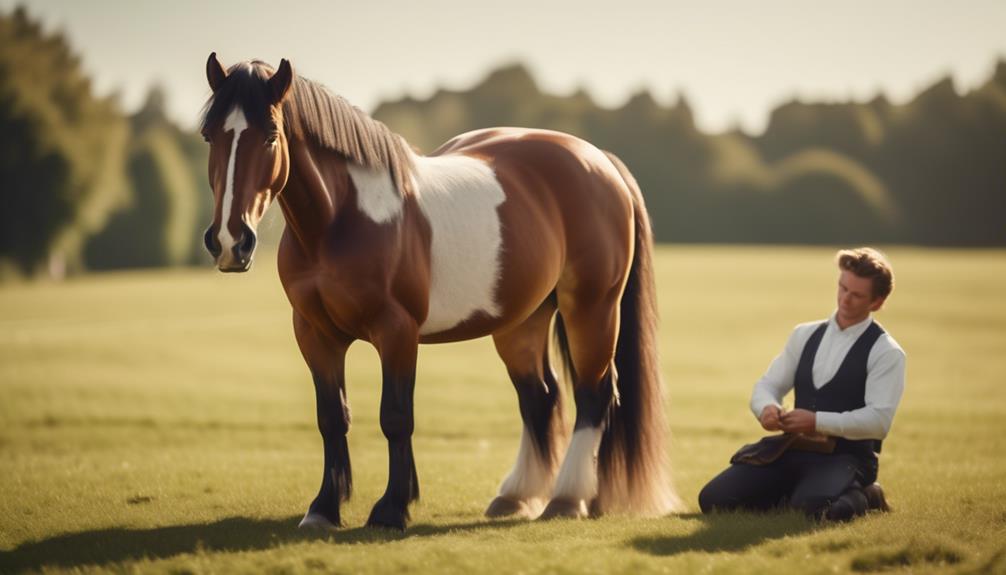
To properly care for a Breton horse and maintain its stunning coat, regular grooming is essential. Here are three important grooming requirements to keep in mind:
- Regular Bathing: Breton horses benefit from regular baths using horse-specific shampoo. This helps keep their coat clean, healthy, and free from dirt and debris.
- Hoof Care: During grooming sessions, it’s important to thoroughly check and clean your Breton horse’s hooves. This helps prevent any issues such as thrush or infections and ensures their hooves remain strong and in good condition.
- Appropriate Tools: To effectively groom your Breton horse, make sure to have the necessary tools on hand. These include a curry comb, dandy brush, body brush, tail and mane brush, and a soft cloth for sensitive areas. Using the right tools will make grooming easier and more comfortable for your horse.
Breton Horse Training and Behavior
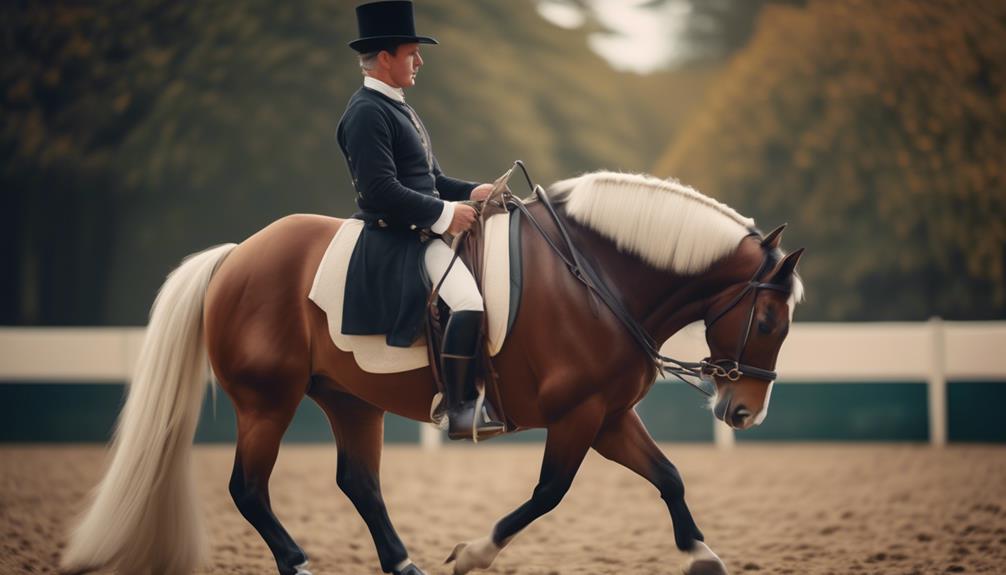
When training and working with a Breton horse, it is important to understand their unique behavior and temperament. Breton horses are known for their calm, kind, and friendly disposition, making them easy to train and work with. They are adaptable and willing, which makes them suitable for all levels of horse owners and riders. These versatile horses excel in various purposes such as light draft work, agricultural work, and pleasure riding. To give you a better understanding of their behavior, here is a table highlighting some key traits of Breton horses:
| Behavior Traits | Description |
|---|---|
| Calm | Breton horses have a naturally calm demeanor. |
| Easygoing | They are easygoing and generally go with the flow. |
| Talented | Breton horses are known for their talents in various disciplines. |
| Lively | Although calm, they have a lively spirit. |
| Noble | Breton horses possess an air of nobility. |
Understanding these traits will help you build a strong bond and successful training relationship with your Breton horse.
Breton Horse Uses and Abilities
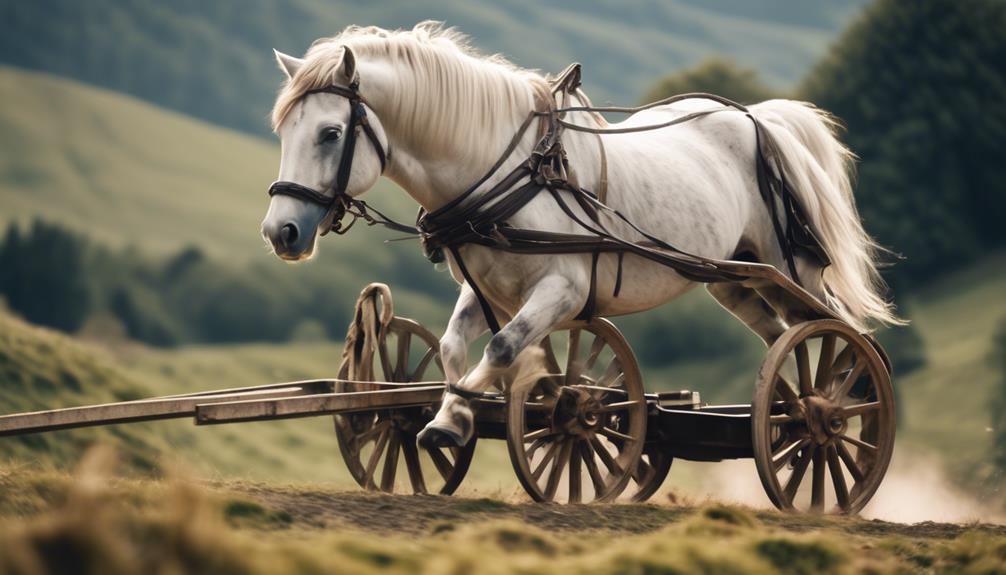
As you explore the uses and abilities of the Breton horse, you’ll discover their remarkable versatility and strength in various disciplines. Here are three key areas where the Breton horse excels:
- Agricultural Work: The Breton horse has a long history of being a reliable partner in the fields. Their sturdy build and powerful muscles make them ideal for pulling heavy loads and navigating challenging terrain. From plowing fields to hauling timber, the Breton horse’s strength and endurance are unmatched.
- Pleasure Riding: Despite their size and strength, Breton horses are known for their gentle disposition and willingness to please. This makes them excellent companions for riders of all skill levels. Whether you prefer leisurely trail rides or more adventurous excursions, the Breton horse’s calm nature and adaptability will make every ride enjoyable.
- Competitive Driving: With their strong build and natural athleticism, Breton horses excel in the sport of competitive driving. Whether it’s pulling a carriage or participating in combined driving events, Breton horses showcase their power, agility, and precision. Their ability to perform under pressure makes them a popular choice among driving enthusiasts.
From the fields to the show ring, the Breton horse’s abilities are truly impressive.
Breton Horse Care and Health
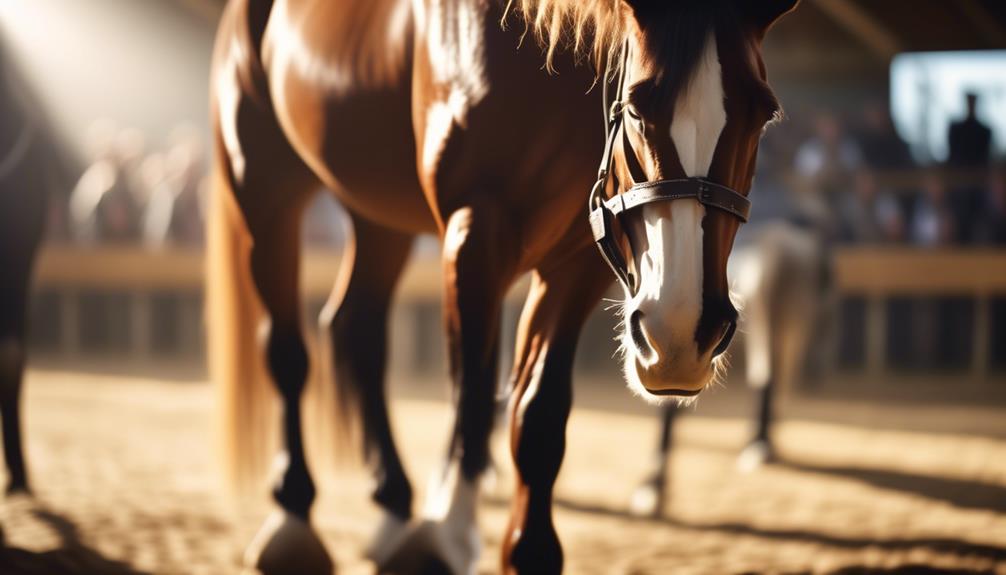
Caring for your Breton horse’s health is essential for ensuring their well-being and longevity. Regular veterinary check-ups are important to monitor their overall health and address any potential issues promptly.
Maintaining a balanced diet is crucial, ensuring they receive the necessary nutrients for their specific needs. This includes providing them with high-quality forage, such as hay or pasture, and a suitable concentrate feed if required.
Adequate exercise is also vital to keep your Breton horse physically fit and mentally stimulated.
Regular grooming is necessary to keep their coat clean and free from dirt, debris, and parasites. Additionally, proper hoof care, including regular trimming and checking for signs of infection or lameness, is essential.
Breton Horse Breeding and Studbook
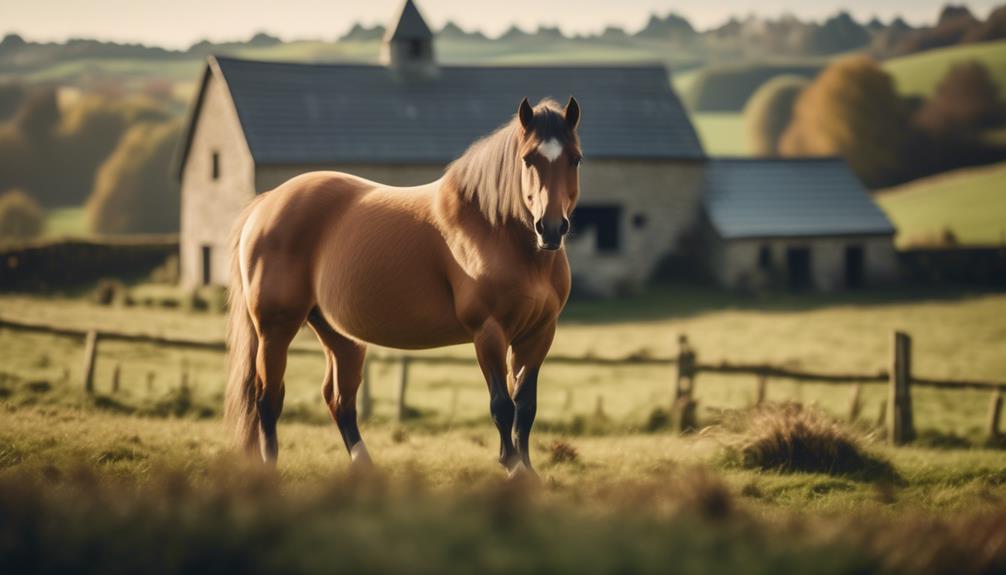
Breton Horse breeding and the establishment of the studbook have played a crucial role in preserving and improving the breed’s quality and characteristics. Here are three key points to understand about Breton Horse breeding and the studbook:
- Preservation of Breed: The studbook was created in 1909 to maintain the purity of the Breton Horse breed. By carefully selecting and recording the lineage of each horse, breeders have ensured that the breed’s unique traits and abilities are passed down through generations.
- Improvement of Traits: The studbook has also allowed breeders to focus on improving specific traits of the Breton Horse. Through selective breeding, they’ve worked to enhance the breed’s strength, endurance, and overall conformation, resulting in a horse that excels in various tasks.
- Genetic Diversity: The studbook has helped breeders maintain a healthy level of genetic diversity within the Breton Horse population. By carefully managing the breeding programs and avoiding inbreeding, they’ve prevented the loss of genetic variation and minimized the risk of inherited health issues.
Through the efforts of breeders and the establishment of the studbook, the Breton Horse continues to thrive as a powerful and versatile breed.
Breton Horse Popularity and Distribution
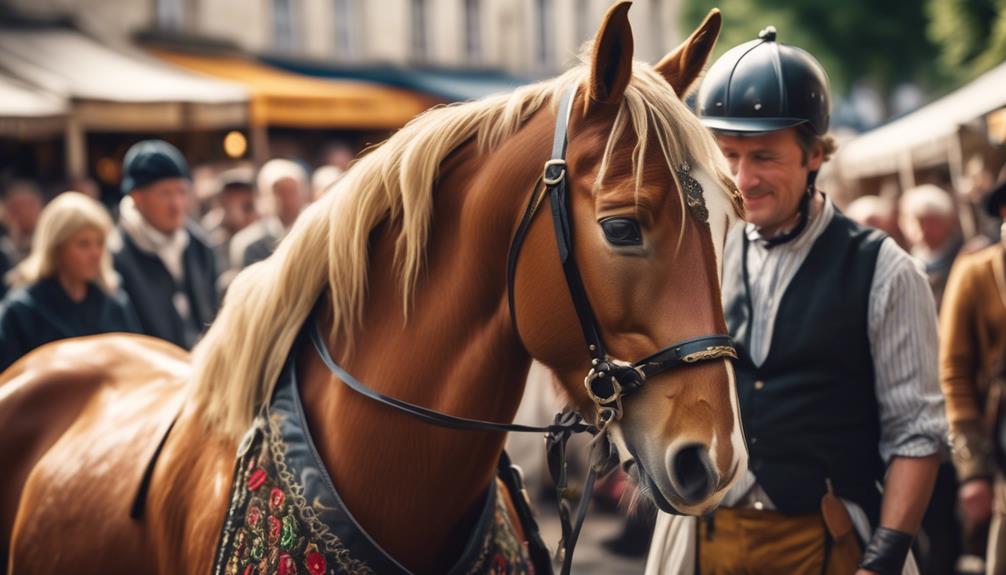
The popularity of the Breton Horse has grown steadily in recent years, as more equestrians recognize its powerful beauty and versatile grace. These majestic horses are captivating riders around the world with their strong physique and gentle temperament.
One of the reasons for their popularity is their adaptability to various activities, making them suitable for all levels of horse owners and riders. Breton Horses excel in light draft work, agricultural tasks, and even pleasure riding. Their sturdy build and willingness to work make them a reliable companion in any equestrian endeavor.
Although the Breton Horse originated in Brittany, France, they can now be found in different parts of the world, thanks to their increasing global popularity. Whether in the fields of France or the riding arenas of other countries, the Breton Horse continues to capture hearts with its power and grace.
Breton Horse Fun Facts and Trivia
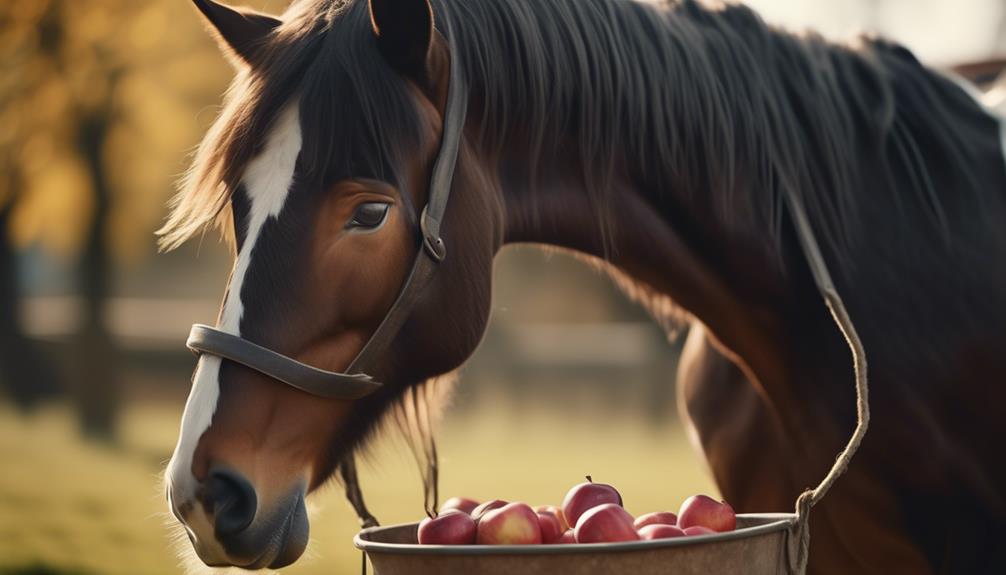
As you delve into the fascinating world of Breton Horses, you’ll be delighted to discover some fun facts and trivia about these magnificent creatures. Here are three interesting things you may not know about Breton Horses:
- Guinness World Record: Breton Horses hold the record for the world’s largest horse parade. In 2006, a staggering 1,582 Bretons gathered in Brittany, France, to showcase their beauty and strength, setting a record that still stands today.
- Power and Endurance: Breton Horses are known for their impressive pulling power. In the early 20th century, they were used extensively for heavy farm work, pulling plows and carts. Their strong muscles and sturdy build make them capable of pulling loads up to five times their own weight.
- Cultural Symbol: Breton Horses have deep cultural significance in Brittany. They’re often featured in local festivals, parades, and traditional events, highlighting their importance in the region’s history and heritage. Their majestic presence and powerful beauty make them a beloved symbol of Brittany’s identity.
Frequently Asked Questions
Are Breton Horses Suitable for Beginners or Inexperienced Riders?
Breton horses are suitable for beginners or inexperienced riders. They are calm, easygoing, and easy to train. Their versatility and sturdy build make them great for various purposes, including pleasure riding.
How Long Does It Take to Groom a Breton Horse Thoroughly?
It takes about 45 minutes to groom a Breton horse thoroughly. Start by checking and cleaning the hooves, then use the curry comb, dandy brush, body brush, and tail and mane brush. Finish with a soft cloth for sensitive areas.
Can Breton Horses Be Used for Competitive Show Jumping?
Yes, Breton horses can be used for competitive show jumping. Their athleticism, adaptability, and willingness to work make them suitable for this discipline. With proper training and care, they can excel in the sport.
What Are the Common Health Issues That Breton Horses May Face?
Common health issues for Breton horses may include lameness, hoof problems, and respiratory issues. Regular veterinary care, proper nutrition, and exercise can help maintain their overall health and prevent these issues.
Are There Any Specific Training Techniques or Methods That Work Best for Breton Horses?
There aren’t any specific training techniques or methods that work best for Breton horses. However, they are easy to train and work with due to their calm, kind, and friendly nature.
What Makes Breton Horses and Holsteiner Horses Both Powerful and Elegant?
The majestic Holsteiner horse is known for its power and elegance, as is the Breton horse. Both breeds possess strong, muscular bodies and graceful movements, making them highly sought after for various equestrian activities. The combination of strength and beauty makes them stand out in the equine world.
Conclusion
So there you have it, a glimpse into the captivating world of Breton horses. These majestic creatures with their powerful beauty and versatile grace have a rich history and unique traits that make them truly special.
Whether you’re an experienced horse owner or a curious enthusiast, the Breton horse breed offers a wonderful companion that’s adaptable, willing to work, and suitable for all levels.
So why wait? Dive into the world of Breton horses and experience their incredible charm for yourself.

